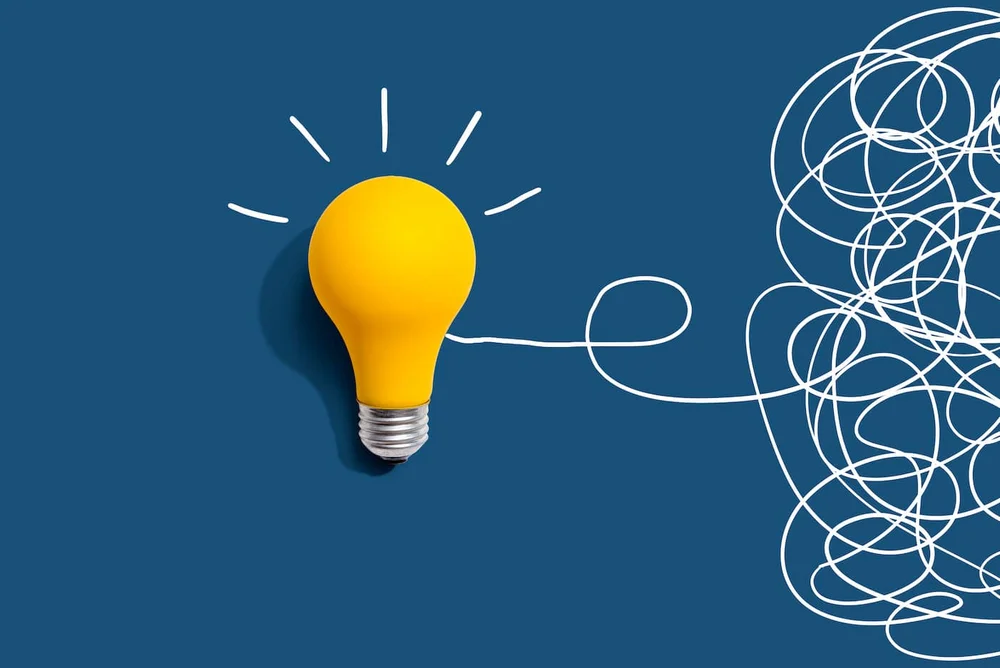- Supplement Store
- Brain Health

Strategies to Improve Your Problem-Solving Skills

Got problems? We all do.
They’re something we encounter daily, both at work and at home. Tackling problems and finding solutions are useful skills that are in high demand.
At a basic level, there are three steps to solving any problem:
- Define the problem
- Generate ideas for solutions
- Implement solutions
You might be tempted to think that the first step is unnecessary. After all, that’s why you’re here in the first place, to solve a problem. However, defining the problem is arguably the most important step in problem-solving.
Albert Einstein is famously quoted as saying, “If I had an hour to solve a problem I’d spend 55 minutes thinking about the problem and 5 minutes thinking about solutions.”
When you can spend more time defining the real problem, and not just a symptom, it will be easier to find a lasting solution.
How to better define the problem:
- Ask “why” questions
- Talk it through with others
- Write down the problem in words
- Use graphs or flow charts
Now that we’ve talked about the steps of solving a problem and how to better define it, let’s dig into some strategies to help your brain perform at its best for solving problems.
“Thanks to a process called neuroplasticity, your brain is continually reorganizing itself by forming new neural connections throughout your life, which gives you the power to make your brain better.” – Daniel G. Amen, MD
Neuroplasticity enables your brain to continue to learn and grow throughout your life. Like your muscles, your brain needs exercise to become stronger. Becoming a life-long learner will not only strengthen your brain, but also sharpen your memory, boost confidence, and bring new knowledge and skills into your life.
3 Ways to Improve Your Problem-Solving Skills

1. Regularly Engage in Brain Boosting Activities
There are a number of easy and fun ways to strengthen your brain. Adding one or more of these activities into your daily routines can help boost your brain and result in better problem-solving abilities.
- Work on a jigsaw puzzle – Puzzles can be done on your own, or as a social activity. Putting together a puzzle requires concentration and spatial awareness, activating multiple parts of the brain and improving short-term memory.
- Play a musical instrument – Research has shown that learning to play an instrument can improve neuroplasticity and help improve your memory. Playing music engages multiple regions of the brain, providing numerous benefits. Maybe it’s been a while since you last played, or maybe you’ve never learned an instrument. Either way, it’s never too late to tap into your musical side and begin making music.
- Try a new hobby – Remember the “use it or lose it” concept when it comes to the brain. It’s recommended to never stop learning new things. Challenge yourself, no matter your age! Trying new hobbies is a great mental exercise to sharpen your brain. You also may find a new activity that brings more joy to your life.
- Meditate – The practice of meditation has been around for thousands of years as a tool for reducing stress, clearing your mind, promoting relaxation, and improving focus. Meditation is a powerful tool that can boost your brain anytime, anywhere.
- Play brain games – Chess, crossword puzzles, and sudoku all fall under this category. Brain games are an easy and fun way to improve concentration and strengthen memory. The best part is that they only take a few minutes to play and offer a nice break during the day.
- Read a book with a book club – Reading a book offers many benefits, including stimulating different areas of your brain to process and analyze information. When you participate in a reading group , your brain will need to remember information for later recall. This information recall is highly beneficial to protecting short-term memory. Book clubs also can provide a fun and supportive social network.
2. Spend time NOT looking for the solution
This is counterintuitive, but it’s an important strategy to use when working on a problem. Allow yourself some downtime after defining the problem.
Let your subconscious do some work. Setting a task aside for a time can actually improve your efforts later. When you return to the problem at hand, you’ll likely have a fresh perspective.
What should you do while giving your brain a break from active problem-solving? Enjoy a hobby, get some rest, or move your body with a walk or other form of exercise.
3. Practice healthy habits
You guessed it, those healthy habits that affect so many areas of your life are also tied to a healthy brain. Exercise, a healthy diet, and quality sleep can all help your brain function better and improve your problem-solving skills overall.
- Exercise – Moving your body increases blood flow to the brain, which can improve your ability to think critically, clearly, and creatively. Additionally, physical activity is a known way to reduce stress and anxiousness. Research has shown creativity and problem-solving to be negatively affected by stress. Using exercise to combat stress can improve your ability to find solutions with a clear mind. By exercising regularly, your overall physical, emotional, and brain health may be positively impacted.
- Healthy Diet – Dr. Daniel Amen teaches that one of the secrets to a healthy brain is to focus on detoxification in your diet. This includes avoiding alcohol, drinking plenty of water, and consuming detoxifying vegetables . Some good vegetables to incorporate into your diet would be lettuce, spinach, kale, broccoli, and asparagus. You also may try increasing your protein intake for a healthy brain, or try adding in turmeric , which can increase neuroplasticity.
- Quality Sleep – Finally, don’t forget about the impact quality sleep, or the lack of it, can have on your brain function and problem-solving abilities. Getting a good night’s rest gives your brain time to recharge and that necessary downtime of not actively thinking about the problems needing solving. While you sleep, your subconscious has a chance to do some work for you!
When you engage in brain-boosting activities, take some downtime, and practice healthy habits you’ll be better prepared for the problems in your days. And, next time you’re faced with the inevitable problems that come with life and work, you can address them with more clarity and confidence.
Amy Huffmire, Writer
Amy Huffmire is passionate about helping individuals and families live their best lives through nutrition and fitness, as she has seen the positive effects these things have had in her own life. She loves to write in many forms and genres from children's stories to research articles. She has a BS in Business from Brigham Young University.
- Heavy PMS Symptoms & Period Cramps? Here’s What Your Body is Telling You - 2024-09-26 15:11:56
- Best Foods to Help Relieve PMS Symptoms + Recipes! - 2024-09-10 11:26:30
- Cycle Syncing Your Lifestyle to Your Menstrual Phases - 2024-08-27 11:03:17
- Try This Proven Trick to Help You Create a New Habit - 2024-08-27 09:41:07
- 5 Gut Health Habits That Will Keep Away the Bloat - 2024-08-09 10:55:50
Related posts

BrainMD Health Has Arrived!
BrainMD Life, Writer
- 5 of the Top Ways a CBCT Scan Can Benefit Your Spine Health! - 2024-05-03 13:05:14
- How Your Heart & Sexual Health Improve Cognitive Function - 2024-02-05 06:15:20
- Veterans Day: One Warrior Shares Some of the Best Ways to Heal from Trauma - 2023-11-02 17:52:44
- Could Your Mood Issues Be Linked to a Pain In the Neck? - 2023-10-13 19:41:41
- What's At the Root of Your Sciatic Nerve Pain? - 2023-09-20 19:16:53

Is Your Gut Messing with Your Brain?

Change Your Brain Everyday: How Dr. Amen’s Book Can Help Improve Your Mental Health
Keith Rowe, Writer
Keith has been a member of the BrainMD team for the past 7 years. Serving as copywriter and editor, he has written 400 blogs and has been involved with the launch of 32 new supplements. He takes many BrainMD supplements daily and his favorite is Neuro-C Vitamin C due to its efficacy and energizing citrus flavor.
- What is BPH and What Foods Can Help? - 2024-11-12 10:00:01
- What You Need to Know About BrainMD’s New Glutathione Supplement! - 2024-11-12 07:00:22
- These Are Some of the Best Nutrients for Sports Recovery - 2024-11-11 09:00:17
- Here Are Some of the Best Foods for Sleep - 2024-11-08 09:30:21
- Head Injury Symptoms – Know the Warning Signs and Best Treatments - 2024-11-07 11:30:02
- Coaching Skills Training
- Coaching TIPS²™
- Continuous Improvement Coaching
- Courageous Conversations Workshop
- Executive Coaching Program
- Feedback 360
- Safety Coaching
- Sales Coaching Training Program
- Free Consultation
- Applied Strategic Thinking®
- Strategic Leadership Course
- Strategic Teaming
- Strategy Development Processes and Services
- Communication Training for Managers
- Conflict and Collaboration
- Confronting Racism Workshop
- Delegation & Accountability
- Diversity, Equity, and Inclusion Workshop
- Flexible Leadership
- Leading Change
- Leading Groups to Solutions
- Leading Innovation
- Mid-Level Management Training
- Qualities of Leadership
- Bottom Line Leadership
- Customized Leadership Development Programs
- Leadership Development Program Design
- Mini-MBA & Operational Finance
- Problem Solving and Decision Making in the Workplace
- Transition to Leadership
- Virtual Leadership
- High-Performance Teamwork
- Leadership Team Alignment Workshop
- Orienteering
- Corporate Outdoor Training and Team Building
- Retreats for Teams
- Innovation Skills Training
- Personal Impact Workshop
- Supervisor Training Programs
- Customization of CMOE’s Learning Library
- Full Curriculum Development and Design
- Learning & Development Advisory Services
- Bottom Line Leadership Training
- Consulting Services
- Leadership Retreats
- Learning and Development Consulting Services
- Needs Analysis and Organization Assessments
- Transformation & Change Solutions
- Facilitator Training Workshop
- Empathic Leadership
- Supervisor Development Series
- All Courses
- Digital Learning
- Books and Publications
- Assessments and Surveys
- Clients Served
- History and Experience
- Meet the CMOE Team
- Testimonials
- Articles & Tools
- Scenario Templates
- Certified Partners
- Event Resources
- Industry Insights
- Resource Library
- Video Library
- News and Events
- Professional Accreditation and Continuing Education Units
- Surveys & Assessments
How to Improve Problem Solving Skills [10 Ways]
While it might seem like some people are just born with stronger problem-solving skills, there are strategies that anyone can use to improve them.
That’s right, it’s possible to significantly enhance your abilities in this area — and the best part is, most of these activities are also pretty fun!
What Are Problem Solving Skills?
Before we get to the engaging activities, let’s refine our understanding of problem-solving skills, which are any techniques that help you consistently:
- Understand the causes of problems
- Overcome short-term crises
- Create strategies to solve longer-term problems
- Turn problems into opportunities
What Problem Solving Skills Should I Have?
You’ll be able to solve problems in your role better as you grow in your industry-specific knowledge. But there are also a few universal problem solving skills we all need:
- Defining the Problem: Deeply understanding a problem through research , leading to better solutions. Research can include interviewing, reading books and emails, analyzing financial data, searching your organization’s intranet, and organizing your findings.
- Brainstorming: Creating a myriad of new solutions quickly. In group brainstorms, allow everyone to state ideas. Appreciate all input, and avoid criticism. Then, organize solutions into groups around common themes.
- Analyzing: Using disciplined thought processes to evaluate each possible solution. Besides listing their costs and benefits, you might apply deductive reasoning, game theory, and the rules of logic (including fallacies) to them.
- Managing Risk: Anticipating and trying to avoid the downsides of key solutions. Your team can list potential risks, rate how likely each is, predict a date by which each might either happen or no longer be an issue, and devise ways to reduce those risks.
- Deciding: The ability to decide on a solution and move forward with it. After an appropriate amount of time, an analysis of possible solutions, and feedback from team members, a designated decider must choose and implement a solution.
- Managing Emotions: Applying emotional intelligence in order to improve your and your team members’ ability to think clearly. This requires you to recognize emotions in yourself and others, manage feelings, and channel emotions into useful work.

10 Exciting Ways to Improve Problem Solving Skills
Use these ten creative ways to improve problem solving skills, develop more strategic ways of thinking , and train your brain to do more.
1. Dance Your Heart Out
Did you know that dancing has a positive impact on neural processing, possibly developing new neural pathways to go around dopamine-depleted blockages in the brain?
This means that if you engage in ballet or another form of structured dance, doing so may facilitate convergent thinking . In other words, it may help you find a single, appropriate answer to a problem. If you need help with divergent thinking (finding multiple answers to a problem), engaging in more improvised types of dance such as hip-hop or tap might just do the trick.
2. Work out Your Brain with Logic Puzzles or Games
The winning strategy when playing chess, Sudoku, a Rubik’s Cube, or other brain-boosting games is actually to work the problem backward, not forward. The same strategy can apply to realistic strategic-thinking situations.
To build up your brain muscle and develop new problem-solving techniques, practice some logic puzzles and other games .
3. Get a Good Night’s Sleep
More than any other sleeping or awake state, Rapid Eye Movement (REM) sleep directly enhances creative processing in the brain. REM sleep helps “stimulate associative networks, allowing the brain to make new and useful associations between unrelated ideas” and are “not due to selective memory enhancements” such as memory consolidation, which occurs when awake.
4. Work out to Some Tunes
A study of cardiac rehabilitation patients tested verbal fluency after exercising with and without music. Results showed that when they listened to music while working out, participants more than doubled their scores on verbal fluency tests in contrast to when they worked out in silence. According to the study’s lead author, “The combination of music and exercise may stimulate and increase cognitive arousal while helping to organize the cognitive output.”
Get Your Free Toolkit to Identify Your Strengths and Minimize Your Weaknesses. Click Here to Download Your Toolkit Today.
5. keep an “idea journal” with you, 6. participate in yoga.
The powerful combination of body awareness, breathing, and meditation that is required during yoga practice has been shown to significantly raise cognitive test scores. Other results from a University of Illinois study include shorter reaction times, more accuracy, and increased attention.
7. Eat Some Cheerios (And Then Think About It)
The Cheerios Effect is the name physicists have given to the event that happens when the last few cheerios in a bowl always cling to each other. The cause of this occurrence is surface tension.
The takeaway is that when it comes to experiencing tension while trying to solve a problem, cling to those around you. Rely on others’ experiences and ideas, even those from different career fields. Draw connections. Brainstorm. Work together to get the job done.
8. Use Mind Maps to Help Visualize the Problem
Mind Maps , a visual snapshot of a problem and its possible solutions, can help focus the mind, stimulate the brain, increase the capacity for creative thinking, and generate more ideas for solutions.
Make a Mind Map by drawing your problem as the central idea. Add “main branches” consisting of all the reasons for the problem. Use “sub-branches” to explore further details.
Next, make a separate Mind Map of all possible solutions to the central problem. Add “main branches” showing all the ways that your problem can be solved, such as colleagues that can help, techniques you can apply, and other resources you can use. Add “sub-branches” to further explore the details. Make a final branch with the most suitable solution for the main problem. Use “sub-branches” for details.
Through this exercise, you should be able to see which “branch” or option is the most practical, time-saving, and cost-effective problem solving method .
9. Create “Psychological Distance”
What is psychological distance? According to the construal level theory (CLT), it’s “anything that we do not experience as occurring now, here, and to ourselves.” Some examples include taking another person’s perspective or thinking of the problem as unlikely.
Scientists have shown that by increasing the mental distance between us and our problem, we’ll have an increase in creative solutions. This happens because thinking more abstractly helps us form unexpected connections between seemingly unrelated concepts, thus allowing our minds to increase its problem solving capacity.
10. Play Some Soccer
A link has been found between our brain’s “executive functions” and sports success . When in action, our brains are quickly multitasking between moving, anticipating, strategizing, reacting, and performing. Doing all these things at once requires an enormous amount of brain activity.
This can be related to our working world when we plan, reason, monitor our actions and problem solve all at once. Therefore, it may be concluded that when you play soccer or any other fast-moving sport, you’re rewiring your brain to be quicker at thinking, processing, and reacting to problems.
To learn more about how to develop your problem-solving and decision making capabilities or to receive training on applied strategic thinking skills , contact CMOE today!
Recommended For You:
Leadership development workshops, get exclusive content delivered straight to your inbox.
When you subscribe to our blog and become a CMOE Insider.
And the best part?
It's 100% free.
As Featured In:
The Better Business Bureau has determined that CMOE meets accreditation standards. These standards verify that CMOE’s product quality and competence enhance customer trust and confidence.
©2024 Center for Management & Organization Effectiveness. All rights reserved.

IMAGES
VIDEO